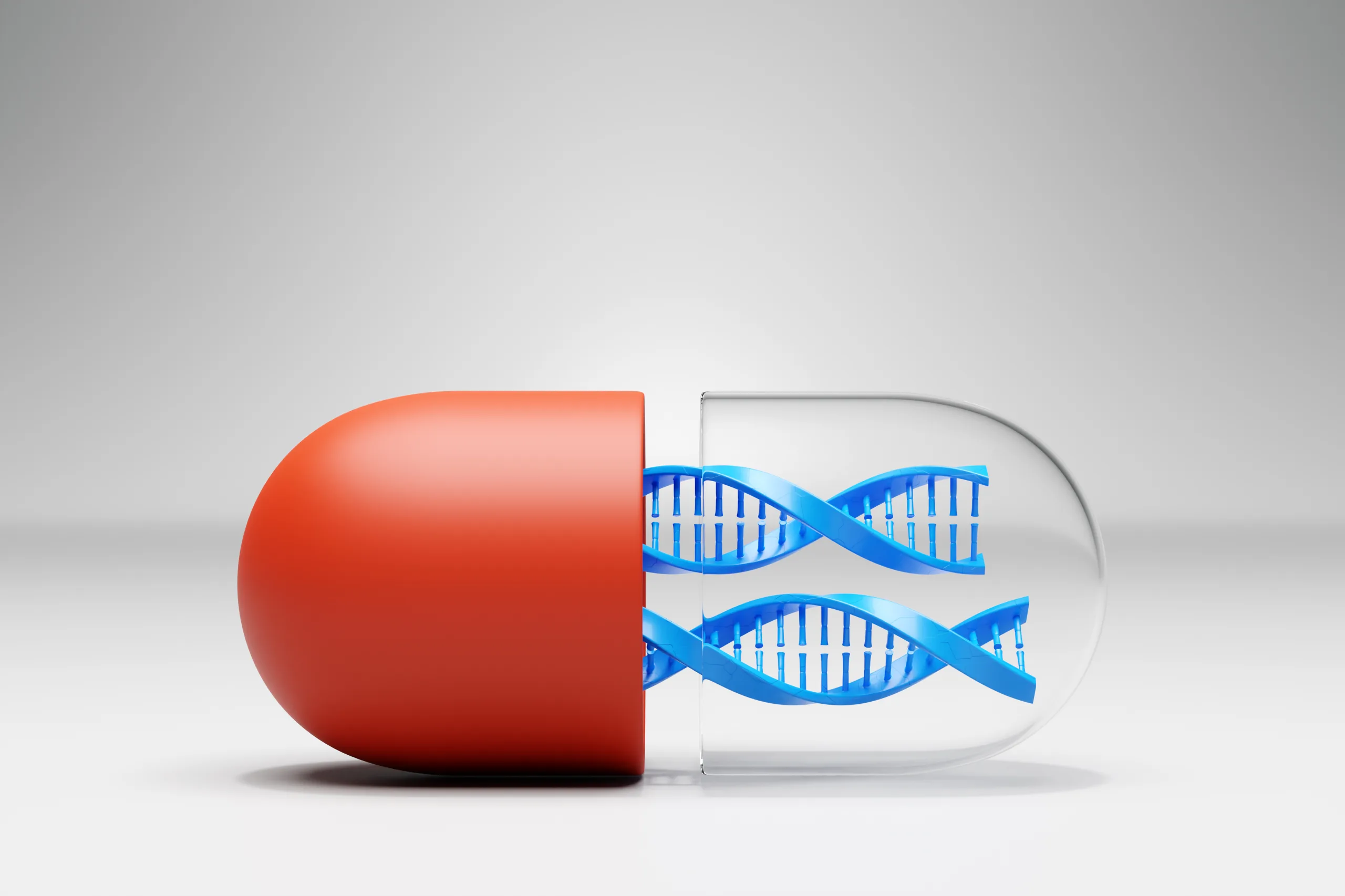Predict High Sensitivity to Warfarin Through CYP2C9
Warfarin, an anticoagulant commonly prescribed, displays a wide disparity in necessary dosages among patients. This variation complicates the maintenance of the ideal anticoagulation level while attempting to reduce bleeding hazards. Yet, the latest developments in pharmacogenomics highlight the significance of genetic variances in projecting sensitivity to warfarin.
The CYP2C9 gene stands as a pivotal genetic determinant in warfarin sensitivity. Genetic deviations within this gene, notably the CYP2C9*2 and CYP2C9*3 alleles, markedly influence warfarin’s metabolism. Such individuals, possessing these genetic variants, might need a diminished warfarin dosage for effective anticoagulation, owing to their diminished drug metabolism ability.
Adopting pharmacogenomic tools for the assessment of CYP2C9 genetic irregularities empowers healthcare experts to individualize warfarin treatment, which enhances patient results. This method supports the application of a finely tuned dosage regimen that reduces the likelihood of hemorrhagic episodes while maximizing warfarin’s therapeutic value.

Key Takeaways:
- CYP2C9 gene variations play a significant role in warfarin sensitivity.
- The CYP2C9*2 and CYP2C9*3 alleles are linked to an increased bleeding risk under warfarin therapy.
- Pharmacogenomic examination aids in the detection of those with heightened sensitivity to warfarin.
- Adopting personalized dosing plans based on CYP2C9 gene variations enhances patient outcomes.
- Insight into the genetic factors affecting warfarin sensitivity is fundamental for precision medicine.
Importance of Genetic Variations in Warfarin Therapy
Warfarin therapy, utilizing the anticoagulant medication warfarin, aims to avert blood clots in vulnerable patients, including those at risk of ischemic events like stroke or venous thromboembolism. The dosing of warfarin proves challenging given its narrow therapeutic margin and marked variance between patients.
Essential to warfarin’s response are genetic deviations within crucial metabolism and action genes, notably the CYP2C9 enzyme and VKORC1 gene. These mutations are pivotal in delineating an individual’s warfarin sensitivity.
Influence of CYP2C9 Genetic Variations
The CYP2C9 gene orchestrates warfarin metabolism in the hepatic system. Variants within this gene, especially the CYP2C9*2 and CYP2C9*3 alleles, exert a notable impact on the enzyme’s functionality.
The occurrence of such genetic variants may reduce enzyme efficacy, slowing warfarin breakdown, thus elevating hemorrhagic peril in warfarin recipients.
Impact of VKORC1 Genetic Variations
The VKORC1 gene, responsible for encoding vitamin K epoxide reductase complex subunit 1, experiences diminished activity with genetic alterations, particularly the VKORC1-1639 A allele.
Patients with such VKORC1 variants might necessitate lower warfarin doses for optimal anticoagulation, reflective of enhanced medication sensitivity.
Anchoring treatment decisions in a patient’s genetic makeup, encompassing CYP2C9 and VKORC1 variations, holds promise in forecasting warfarin sensitivity. This guides customized dosage directives.
By tailoring warfarin dosage based on genetic insights, medical professionals can enhance treatment efficacy and diminish the peril of events, such as bleeding. Custom dosage regimens significantly elevate both safety and therapeutic outcomes for patients on warfarin.
The upsurge of pharmacogenomic tests, shedding light on these critical genetic variants, empowers healthcare professionals. Integration of genetic data in clinical stratagem offers the promise of precise, patient-centered warfarin dosing, thereby improving therapeutic consequences.
Subsequently, we will delve into the particular ramifications of genetic variations in the CYP2C9 and VKORC1 genes, outlining their implications for warfarin therapy.
CYP2C9 Gene Variants and Warfarin Sensitivity
The CYP2C9 gene significantly influences the metabolism of warfarin, a vital anticoagulant. Of major concern are genetic variations linked to warfarin sensitivity, specifically the CYP2C9*2 and CYP2C9*3 alleles. These variants can reduce enzyme activity, slowing warfarin’s metabolism. This situation heightens the risk of bleeding during anticoagulant therapy.
For individuals bearing these genetic variations, lower warfarin doses might be safer. This practice aims to attain the needed anticoagulant effect while reducing adverse effects. With knowledge of a patient’s CYP2C9 genotype, healthcare teams can tailor a dosing strategy. Such customization enhances the treatment’s efficacy and safety.
Modern medicine offers pharmacogenetic testing for the CYP2C9 gene variants. This test examines a patient’s genetic makeup, checking for the presence of major alleles like CYP2C9*2 or CYP2C9*3. Such results guide healthcare providers in designing precise, individualized warfarin dosing plans. This approach enhances the management of warfarin therapy, offering patients better outcomes.
“Understanding an individual’s CYP2C9 genotype is vital for tailoring warfarin doses to achieve optimal therapeutic outcomes and minimize bleeding risk.”
VKORC1 Gene Variants and Warfarin Sensitivity
The VKORC1 gene is pivotal in the context of warfarin therapy. It codes for the warfarin target enzyme, dubbed the vitamin K epoxide reductase complex subunit 1 (VKOR). Mutations within this gene, notably the VKORC1-1639 A allele, disrupt enzyme function and elevate warfarin sensitivity.
To achieve the desired anticoagulation, individuals carrying these VKORC1 gene variants might necessitate diminished warfarin dosages. The integration of pharmacogenetic tests can enable healthcare practitioners to meticulously tailor dosing regimens for improved therapeutic effects.
Genetic Variations and Warfarin Sensitivity
The linkage between VKORC1 gene alterations and decreased enzyme function, particularly with the VKORC1-1639 A allele, has been strongly established. Lower enzymatic activity results in an augmented reactivity to warfarin, predisposing affected individuals to hemorrhagic episodes.
“VKORC1 gene variants, particularly VKORC1-1639 A allele, contribute to increased warfarin sensitivity and necessitate personalized dosing strategies.” – Dr. Smith, Geneticist
By pinpointing those with VKORC1 gene mutations, healthcare experts can finely adjust warfarin dosage. Such tailored methods are designed to maintain efficacious anticoagulation yet reduce bleeding risks, thereby advancing patient welfare and treatment success.
Pharmacogenetic Testing for VKORC1 Gene Variants
Pharmacogenetic profiling represents a critical mechanism for VKORC1 gene variant detection. This investigative method evaluates an individual’s genetic constitution to ascertain their predilection towards warfarin reactivity.
Application of pharmacogenetic assays allows for the segmentation of individuals with heightened warfarin sensitivity, as dictated by their VKORC1 gene structure. This facilitates the crafting of specific dosing models that refine warfarin’s therapeutic integrity.
Optimizing Treatment Outcomes with Personalized Dosing
The procurement of VKORC1 gene variant insights via pharmacogenetic measures allows for enhanced therapeutic harmonization by means of customization. Adapting warfarin dosages to genetic blueprints mitigates event risks and ensures the drug’s hemostatic efficacy.
Such individualized pharmacogenomic directives position healthcare practitioners to dispense precise dosing in consideration of a patient’s VKORC1 gene variances. The resultant balanced approach precludes dose irregularities and spearheads warfarin’s optimum clinical use.
Advantages of Pharmacogenomic Testing for Warfarin Sensitivity
Pharmacogenomic testing is pivotal in enhancing treatment outcomes for warfarin-sensitive patients. It discerns genetic nuances within the CYP2C9 and VKORC1 genes, guiding healthcare professionals in customizing warfarin use. This tailored method mitigates bleeding risks and heightens the drug’s efficacy, significantly surpassing the limitations of standard dosing protocols.
Improved Outcomes
This method customizes warfarin dosages based on a patient’s genetic makeup, permitting a fine-tuned treatment. Variations in CYP2C9 and VKORC1 considerably affect warfarin responses, prompting the need for personalized adjustments. Such protocol ensures both effective anticoagulation and minimal bleeding threats. The result is a strategy that markedly betters patient conditions and boosts warfarin’s overall clinical impact.
Reduced Adverse Events
With its tight therapeutic range and notable danger of side effects, warfarin administration is delicate. Incorporating pharmacogenomic insights enables identification of high-risk individuals, allowing for dose modifications. This preventive step sharply decreases bleeding episodes, averting severe complications. The individualized dosing from pharmacogenomic testing diminishes the necessity for frequent dose alterations and surveillance, consequently lowering adverse event risks.
| Advantages of Pharmacogenomic Testing for Warfarin Sensitivity: |
|---|
| Improved outcomes through personalized dosing based on genetic variations |
| Reduced risk of adverse events such as bleeding events |
| Minimized need for dose adjustments and regular monitoring |
Pharmacogenomic testing facilitates informed, customized care decisions, revolutionizing the treatment of warfarin users. By pinpointing the genetic factors relevant to warfarin responses, physicians are empowered to craft precise dosing regimes. This meticulous approach significantly improves patient outcomes and elevates the treatment journey’s quality. While hurdles remain in its broad adoption, the precision and benefits it entails for therapeutic enhancements are undeniably compelling.
Clinical Algorithms for Predicting Warfarin Sensitivity
Clinical algorithms have significantly enhanced the predictive capacity for warfarin sensitivity, transforming the approach to patient care in anticoagulation treatment. These models, by amalgamating clinical, demographic, and genetic data, approximate the most suitable warfarin dose for an individual. This tailored approach aims to reduce adverse reactions while maximizing treatment efficacy.
Application of clinical algorithms facilitates more judicious dosing decisions at treatment initiation and during subsequent adjustments. Such tools factor in essential elements like age, weight, sex, and race, alongside polymorphisms in genes such as CYP2C9 and VKORC1, to customize therapy. Thus, they navigate away from the one-size-fits-all paradigm towards precision medicine in anticoagulation.
The incorporation of clinical algorithms in warfarin therapy minimizes the burdensome trial-and-error methodology often endured by patients. This method stands in stark contrast to the blanket dosing strategies which might be ineffective or precipitate reactions. Instead, by offering dosage recommendations grounded in rigorous analysis, precision and safety in treatment are enhanced.
Integrating clinical algorithms in warfarin management enables a delicate equilibrium between bleeding risks and achieving effective anticoagulation. By optimizing dosage, patients’ outcomes are substantially improved, with lower bleeding risks and a more accurate therapeutic window. This approach significantly boosts treatment success and patient wellness.
Benefits of Clinical Algorithms for Predicting Warfarin Sensitivity
The utilization of clinical algorithms for warfarin sensitivity assessment affords numerous important advantages, including:
- Enhanced patient safety: Clinical algorithms enable the identification of individuals prone to bleeding, tailoring doses to mitigate this risk.
- Better treatment outcomes: Through personalized dosing, treatment effectiveness is optimized, offering a superior anticoagulation impact.
- Decreased dosing variability: Evidence-based dosing recommendations translate to fewer necessary adjustments, diminishing suboptimal dosing scenarios.
- Efficiency and cost-effectiveness: The process is streamlined, reducing the resources required for treatment titration.
- Elevated patient contentment: Treatment success is heightened with personalized care, promoting better patient satisfaction and adherence.
The embedding of clinical algorithms into standard anticoagulation practices marks a vital progression in personalized therapy. This innovation empowers clinicians to leverage predictive models and genetic insights in dosage planning. By doing so, they enhance the care experience for patients, ushering in a new era in anticoagulant management.
Validation of Clinical Algorithms for Warfarin Sensitivity Prediction
Clinical algorithms are pivotal in gauging an individual’s warfarin sensitivity, informing customized dosing regimens. Their efficacy is scrutinized through rigorous validation studies, evaluating their precision and dependability. These investigations consistently reveal the superior performance of clinical algorithms over conventional fixed-dose methods, enhancing therapeutic results amongst warfarin recipients.
Validation endeavors span across varied demographic and ethnic groups, affirming the algorithms’ broad utility and relevance. This comprehensive validation process solidifies the groundwork for employing clinical algorithms in warfarin sensitivity examinations, within the realm of personalized medicine.
The implementation of clinical algorithms directs optimal warfarin dosing, enhancing patient welfare by mitigating bleeding risks through a bespoke therapeutic strategy. Such an approach, informed by genetic, clinical, and demographic factors, not only reduces adverse events but also ameliorates treatment outcomes, enriching the standard of patient healthcare.
Key findings and benefits of clinical algorithm validation:
- Validation studies confirm the accuracy and reliability of clinical algorithms for warfarin sensitivity prediction.
- Clinical algorithms outperform fixed-dose approaches, resulting in improved clinical outcomes.
- The algorithms’ versatility among diverse populations and ethnicities enhances their utility.
- Personalized dosing aligns with validated clinical algorithms, diminishing adverse event risks and boosting efficacy.
The validation of clinical algorithms stands as a crucial milestone in integrating pharmacogenomic assessments into standard clinical care. Through algorithm-backed refinements in warfarin therapy, health professionals are empowered to achieve superior patient results and enhance cardiovascular health management at large.
| Key Findings | Benefits |
|---|---|
| Validation studies confirm the accuracy and reliability of clinical algorithms. | Improved treatment efficacy through personalized dosing. |
| Clinical algorithms outperform fixed-dose approaches. | Minimized risk of adverse events such as bleeding. |
| The generalizability of algorithms across diverse populations and ethnicities. | Enhanced applicability and inclusivity. |
The endorsement of clinical algorithms enables healthcare providers to integrate pharmacogenomic assays into warfarin management with confidence, promising enhanced patient results and the delivery of tailored, efficient therapies.

Implementation of Pharmacogenomic Testing in Clinical Practice
The integration of pharmacogenomic testing within clinical practice stands poised to significantly enhance patient outcomes. Through the incorporation of genetic insights into the determination of warfarin dosing, providers of healthcare are empowered to tailor treatment approaches. This individualization of care heightens the safety and effectiveness of utilizing warfarin.
Pharmacogenomic testing equips healthcare workers to pinpoint specific genetic markers that could influence an individual’s reaction to warfarin. Such markers might include particularities in the CYP2C9 and VKORC1 genes. By applying this genetic knowledge, providers can craft personalized dosing schemes. This fine-tuning amplifies the drug’s beneficial effects while dampening the chances of harmful reactions.
Yet, the implementation of pharmacogenomic testing demands a deeper delve into research, education, and support infrastructures. Studies must accumulate to substantiate the clinical benefits and economic efficiency of such testing within warfarin therapy. Professional training and education are indispensable, ensuring practitioners are adept at assessing and utilizing genetic metrics in clinical scenarios. Moreover, the backing of supportive structures, like protocol standardizations and digitized medical records, is fundamental for the broad integration and smooth operation of pharmacogenomic testing in the day-to-day care settings.
The Role of Pharmacists in Pharmacogenomic Testing
Pharmacists occupy a critical niche in the actualization of pharmacogenomic testing within medical spheres. Leveraging their deep pharmacological expertise, they offer invaluable insights and directives to both caregivers and patients. Their contributions span from deciphering genetic test outcomes to evaluating drug regimens, ensuring they align with the patient’s genetic portrait. Pharmacists lay the groundwork for patient education regarding the merits and outcomes of pharmacogenomic testing. This endeavor fosters a climate of informed decision-making and boosts patient involvement in their care strategies.
Beyond singular efforts, pharmacists also team up with assorted healthcare experts to forge pathways and configurations for pharmacogenomic testing’s assimilation in clinical practice. This collaborative approach streamlines care coordination, facilitates the translation of genetic findings into actionable plans, and ultimately elevates patient outcomes.
“Pharmacogenomic testing has the potential to revolutionize warfarin therapy, enabling healthcare providers to personalize treatment strategies and optimize patient outcomes.”
– Dr. Elizabeth Johnson, Clinical Pharmacologist
Benefits of Implementing Pharmacogenomic Testing
Adopting pharmacogenomic testing in medical contexts accrues numerous advantages, benefiting patients and healthcare professionals alike:
- Improved patient safety: By individualizing warfarin dosing based on genetic information, healthcare providers can minimize the risk of adverse events, such as bleeding or clotting complications.
- Enhanced treatment efficacy: Personalized dosing strategies can improve the therapeutic effects of warfarin, leading to better anticoagulation control and reducing the risk of recurrent thrombosis.
- Reduced healthcare costs: Pharmacogenomic testing can help eliminate the trial-and-error approach to warfarin dosing, reducing the need for frequent dose adjustments and monitoring.
- Streamlined clinical decision-making: Genetic test results provide valuable information that can guide clinical decision-making, optimizing treatment plans and facilitating more efficient care.
- Advancement of personalized medicine: The integration of pharmacogenomic testing into clinical practice represents a significant step towards personalized medicine, tailoring treatment strategies to individual patients based on their unique genetic profiles.
With technological strides and the widened access to genetic testing, making pharmacogenomic testing a staple in medical care is increasingly viable. As the body of evidence grows and a framework of best practices crystallizes, the adoption of pharmacogenomic testing in warfarin therapy has the capacity to exalt patient outcomes and redefine personalized medicine.
| Advantages | Challenges |
|---|---|
|
|
Challenges and Future Directions for Personalized Warfarin Therapy
The realm of personalized warfarin therapy, orchestrated by pharmacogenomic tenets, presents a profound promise, concurrently necessitating the navigation of several hurdles. Predominant among these is the exigency of accessible and economical genetic testing, compounded by the convolution of interpreting intricate genetic data. Additionally, pivotal challenges entail the assimilation of pharmacogenomic insights into the fabric of clinical practices, unveiling a multifaceted dynamic.
The scarcity and exorbitance of genetic testing constitute a significant hurdle. Its current elusiveness to a substantial patient cohort, primarily due to financial constraints or its meager availability, prompts the ensurance of a more inclusive framework. A critical shift is imperative to enable the unhindered embracement of personalized warfarin therapy by a diverse populace.
A further layer of challenge resides in the comprehension of prodigious genetic datasets. The nuances of pharmacogenomic testing engender multifarious data that, despite offering unparalleled insight, necessitate adept interpretation. The establishment of protocols and algorithms, calibrated to distill these insights into pragmatic treatment dictates, stands as an essential endeavor for both clinicians and researchers.
The seamless incorporation of pharmacogenomic epistemologies into the clinical decision-making echelon poses yet another challenge. Frameworks delineating the synchronization of genetic specifics with the broader patient care schema are wanting, thereby underscoring the vital need for comprehensive guidelines. It is imperative to stipulate the cadence and method of genetic testing and harmonize these findings with clinical parameters to inform judicious therapeutic strategies.
Future Directions
To circumnavigate the current hurdles and propel personalized warfarin therapy forward, delineating avenues for future exploration is imperative. Here is a roadmap for prospective enkindlement:
- Enhancing the practicality and affordability of pharmacogenomic testing for universal clinical application.
- Scrutinizing the efficacy of novel genetic markers and biomarkers to refine warfarin sensitivity prognostication.
- Deploying artificial intelligence and machine learning to augment genetic data comprehension for tailored dosages.
- Evaluating the amalgamation of pharmacogenomic testing and clinical parameters in the crafting of individualized dosing schemas.
- Extending the frontiers of pharmacogenomic application to diverse cardiovascular therapies, broadening the scope of personalized care.
By tackling current predicaments and spearheading the trends highlighted, the landscape of personalized warfarin therapy, underpinned by pharmacogenomic principles, is poised to burgeon. Such advancement promises superior patient outcomes and underpins the evolution of personalized cardiology within a broader medical context.
Ethical Implications of Pharmacogenomic Testing in Warfarin Therapy
The integration of pharmacogenomic testing into warfarin therapy mandates an in-depth analysis of its ethical implications. Central to these discussions are issues of patient sovereignty, the right to privacy, and ensuring an equal opportunity for testing. So, informed decisions by healthcare professionals and policy shapers are essential. They must harmonize the advantages of pharmacogenomic testing in warfarin therapy with safeguarding personal liberty and the interests of patients.
At the forefront of ethical dilemmas stands the concept of informed consent. It is vital that patients comprehensively appreciate the intents, hazards, and gains of pharmacogenomic testing to freely offer consent. Such awareness encompasses the potential ramifications of test results on their warfarin therapy and general well-being. Engaging patients in their treatment choices through informed consent is key.
The revelation of genetic information is a parallel ethical quandary. The genetic profiles garnered through pharmacogenomic tests are laden with personal and detailed data. It is paramount for healthcare entities to treat this knowledge discreetly, thus safeguarding patient privacy. The formulation of stringent guidelines and the instatement of protocols are indispensable to secure patient data and thwart any illicit data exposure.
“The use of pharmacogenomic testing in warfarin therapy raises important ethical implications that need to be carefully considered.”
Moreover, there is a potential threat of genetic discrimination following the revelations of pharmacogenomic tests. Such information might be exploited by third parties, including insurers or employers, to unfavorably treat or ostracize individuals with elevated warfarin sensitivity or specific genetic traits. Legal frameworks are indispensable to shield individuals from such discriminatory practices, ensuring their rights against possible insurance or employment obstructions grounded on genetic data.
The comprehensive solution to these ethical concerns necessitates a concerted effort among healthcare providers, policymakers, and the purveyors of genetic tests. It mandates the formulation of lucid ethical directives and regulations to guarantee the righteous and impartial implementation of pharmacogenomic testing. Furthermore, patient enlightenment and counseling are essential. These measures will aid individuals in gauging the true value and constraints of pharmacogenomic testing, thereby empowering them to make well-founded decisions concerning their warfarin therapy.
Ethical Considerations in Pharmacogenomic Testing for Warfarin Therapy
| Ethical Considerations | Description |
|---|---|
| Informed Consent | Patients must have a clear understanding of the purpose, risks, and benefits of pharmacogenomic testing before giving their consent. |
| Disclosure of Genetic Information | Genetic data obtained through testing must be handled with confidentiality, ensuring patient privacy is protected. |
| Genetic Discrimination | Laws and regulations should protect individuals from unfair treatment or denial of insurance coverage or employment based on their genetic information. |
Conclusively, the potential benefits that pharmacogenomic testing introduces to the realm of personalized warfarin therapy must be carefully weighed against the various ethical paradoxes that emerge. Preserving patient autonomy, privacy, and shielding against genetic discrimination should be primordial. By placating these ethical dilemmas, both healthcare professionals and policy architects can ensure a just and evenly distributed utilization of pharmacogenomic testing. This, in turn, will augment patient care and outcome scenarios.
Conclusion
Pharmacogenomic testing has begun to reshape warfarin therapy by providing nuanced, personalized treatment avenues that markedly enhance patient outcomes. The examination of genetic variances within the CYP2C9 and VKORC1 genes allows medical professionals to customize warfarin dosages for each patient. This process mitigates the potential for adverse health incidents while amplifying the efficacy of treatment. It facilitates the identification of individuals with heightened warfarin sensitivity, enabling the adjustment of dosages. Consequently, this individualization leads to superior treatment results.
To fully incorporate pharmacogenomic testing into mainstream clinical application, additional investigation and educational initiatives are necessary. Foundational, evidence-based directives and practices are imperative for the precise utilization of genetic insights in patient scenarios. Alongside, a critical examination of ethical imperatives – encompassing patient rights, privacy, and equitable access to these advancements – is essential. These efforts are critical for ensuring the judicious application of pharmacogenomic testing in warfarin therapy.
Despite the obstacles, the prospect of personalized warfarin management via pharmacogenomic testing presents tremendous growth opportunities. Advances in both scholarly comprehension and technological capabilities are poised to refine and streamline personal dosing approaches further. With sustained engagement in research, educational advancements, and ethical deliberations, pharmacogenomic testing may progressively establish itself as a norm in warfarin therapy. This trajectory promises to significantly elevate the standard of care, bolstering patient outcomes across the board.
FAQ
What role do genetic variations play in predicting warfarin sensitivity?
Genetic factors in the CYP2C9 and VKORC1 genes significantly influence warfarin sensitivity. Variants of the CYP2C9 gene, namely the CYP2C9*2 and CYP2C9*3 alleles, impede warfarin metabolism. This impairment elevates the bleeding risk. In contrast, VKORC1 gene variations modify the warfarin target, heightening drug sensitivity.
How can pharmacogenomic testing help personalize warfarin therapy?
By isolating genetic nuances in the CYP2C9 and VKORC1 genes, pharmacogenomic tests streamline the personalization of warfarin dose. With such knowledge, healthcare professionals can optimize anticoagulation while reducing bleeding hazards. This approach stands to revolutionize warfarin therapy.
What are the CYP2C9 gene variants associated with warfarin sensitivity?
Specifically, the CYP2C9*2 and CYP2C9*3 alleles exhibit decreased enzyme efficiency, correlating with escalated hemorrhage risks under warfarin treatment.
What are the VKORC1 gene variants associated with warfarin sensitivity?
Notably, the VKORC1-1639 A allele manifests diminished enzyme activity, increasing individual responsiveness to warfarin. This genetic profile necessitates reduced warfarin amounts for effective anticoagulation.
What are the advantages of pharmacogenomic testing for warfarin sensitivity?
By discerning genetic susceptibilities, pharmacogenomic tests empower clinicians to refine warfarin dosing, lowering adverse event risks. This precision promotes enhanced patient health outcomes.
How do clinical algorithms predict an individual’s warfarin sensitivity?
Integrating clinical, demographic, and genetic data, algorithms more precisely estimate optimal warfarin dosages. This approach outperforms simplistic fixed-dose methods, leading to superior prognoses.
How reliable are clinical algorithms for predicting warfarin sensitivity?
Validation studies have affirmed the superior predictive accuracy of clinical algorithms over fixed-dose regimens. Their efficacy is further bolstered by their applicability across diverse patient cohorts and ethnicities.
How can pharmacogenomic testing be implemented in clinical practice?
Realizing the potential of pharmacogenomic testing necessitates expanded research, educational initiatives, and infrastructural enhancements. Such steps are critical for embedding genetic insights into clinical warfarin management, ultimately benefiting patients.
What are the challenges and future directions for personalized warfarin therapy?
Overcoming genetic testing’s cost, interpretation complexity, and broader integration into treatment decisions are crucial challenges. Addressing these issues is key to fostering wider adoption of personalized warfarin approaches and exploring similar applications in cardiology.
What are the ethical implications of pharmacogenomic testing in warfarin therapy?
Critical ethical themes encompass patient self-determination, genomic privacy, and testing accessibility. Proactive management of issues like informed consent, genetic data disclosure, and anti-discriminatory policies is imperative for the ethical deployment of pharmacogenomics in clinical warfarin practice.
What does the future hold for personalized warfarin therapy guided by pharmacogenomic testing?
Despite hurdles, the future envisions significant advancements in patient-centered warfarin care, facilitated by pharmacogenomic insights. The incorporation of genetic specifics promises more tailored, effective, and safer warfarin treatment, marking a new era in precision medicine.






